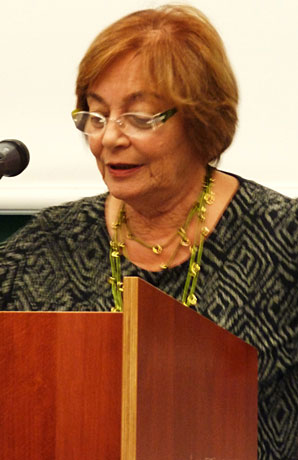"There was a lot he could do, but it wasn't enough." Shulamit Volkov almost has to laugh at her own choice of words; they sound so simple, but nevertheless summarize so fittingly what the new Allianz visiting professor has discussed over the last hour. In her lecture she paints a portrait of a controversial politician, a great industrialist, and above all a split personality.
Walter Rathenau came from a reputable Jewish family, his father Emil founding the "Deutsche Edison-Gesellschaft für angewandte Elektricität" (later AEG) in 1883. Although the family belonged to the social elite, they were often exposed to anti-Semitic sentiment, something that Walther Rathenau in particular suffered from his whole life. He's quoted as saying: "In the youth of every German Jew there comes a painful moment that he will remember for the rest of his life: when he becomes fully aware for the first time that he has entered the world as a second-class citizen, and that no amount of ability or merit can rid him of this status."
A "futile and unfounded war"
His relationship with his own identity, fraught with difficulty, was reflected in his conflicting attitudes towards war and patriotism. "Not least because of his Jewish heritage, he himself was denied the chance to have a great military career," Volkov reasons. Shortly before the outbreak of the First World War in 1914, Rathenau was still convinced that what he considered to be a "futile and unfounded war" could still be avoided. He criticized the population's enthusiasm and labeled the government "sleepwalkers".
Despite this, he pressed forward with his political career, driven by his considerable ambition which was only amplified by his father's high expectations. The year the war started he presented his plans for the creation of a War Raw Materials Department (Kriegsrohstoffabteilung - KRA) to the Prussian government. The great successes achieved by the Ministry under his leadership nevertheless placed Walter Rathenua in a dilemma, as Shulamit Volkov describes: "His work secured Germany's survival and with it led to the prolongation of a war that he himself never wanted."
"Rathenau often took offence"
In 1922, once the war was over, Rathenau became Foreign Minister of the Weimar Republic. That Germany played a strong role was important to him, but his relationship with patriotism was a difficult one. Even before his term of office he maintained a certain proximity to the political elite, whilst simultaneously being its biggest critic. Rathenau was stubborn and provocative. "He often took offence," remarks Volkov with a smile.
This political style of his made him the target of a number of threats, but Rathenau continued to live his life normally and refused police protection. In the summer of 1922 he was the victim of a lethal attack by the right-wing extremist nationalistic group Organisation Consul.
Rathenau's impulsive, irresponsible, yet often very sensitive manner always stood in stark contrast to his political behavior: in the political sphere his actions were reserved, controlled and prescient. As Shulamit Volkov comments, "Rathenau had better vision, but his influence was limited and his reasoning skills inadequate." There was a lot he could do, indeed, but it wasn't enough.
